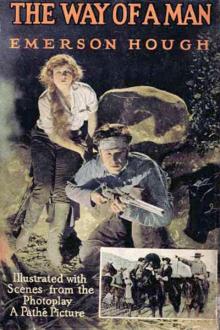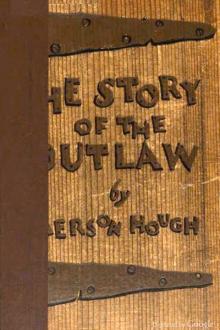The Passing of the Frontier, Emerson Hough [rocket ebook reader txt] 📗

- Author: Emerson Hough
- Performer: -
Book online «The Passing of the Frontier, Emerson Hough [rocket ebook reader txt] 📗». Author Emerson Hough
Always in America we have occupied the land as fast as it was feasible to do so. We have survived incredible hardships on the mining frontier, have lived through desperate social conditions in the cow country, have fought many of our bravest battles in the Indian country. Always it has been the frontier which has allured many of our boldest souls. And always, just back of the frontier, advancing, receding, crossing it this way and that, succeeding and failing, hoping and despairing—but steadily advancing in the net result—has come that portion of the population which builds homes and lives in them, and which is not content with a blanket for a bed and the sky for a roof above.
We had a frontier once. It was our most priceless possession. It has not been possible to eliminate from the blood of the American West, diluted though it has been by far less worthy strains, all the iron of the old home-bred frontiersmen. The frontier has been a lasting and ineradicable influence for the good of the United States. It was there we showed our fighting edge, our unconquerable resolution, our undying faith. There, for a time at least, we were Americans.
We had our frontier. We shall do ill indeed if we forget and abandon its strong lessons, its great hopes, its splendid human dreams.
BIBLIOGRAPHICAL NOTEANDY ADAMS, “The Log of a Cowboy,” 1903. “The Outlet,” 1905.
Homely but excellently informing books done by a man rarely qualified for his task by long experience in the cattle business and on the trail. Nothing better exists than Adams’s several books for the man who wishes trustworthy information on the early American cattle business.
GEORGE A. FORSYTH, “The Story of the Soldier,” 1900.
GEORGE BIRD GRINNELL, “The Story of the Indian,” 1895.
EMERSON HOUGH, “The Story of the Cowboy,” 1897.
CHARLES HOWARD SHINN, “The Story of the Mine,” 1901.
CY WARMAN, “The Story of the Railroad,” 1898. The foregoing books of Appleton’s interesting series known as “The Story of the West”
are valuable as containing much detailed information, done by contemporaries of wide experience.
FRANCIS PARKMAN, “The Oregon Trail,” 1901, with preface by the author to the edition of 18991. This is a reprint of the edition published in 1857 under the title “Prairie and Rocky Mountain Life,” or “The California and Oregon Trail,” and has always been held as a classic in the literature of the West. It holds a certain amount of information regarding life on the Plains at the middle of the last century. The original title is more accurate than the more usual one “The Oregon Trail,” as the book itself is in no sense an exclusive study of that historic highway.
COLONEL R. B. MARCY, U. S. A., “Thirty Years of Army Life on the Border,” 1866. An admirable and very informing book done by an Army officer who was also a sportsman and a close observer of the conditions of the life about him. One of the standard books for any library of early Western literature.
EMERSON HOUGH, “The Story of the Outlaw,” 1907. A study of the Western desperado, with historical narratives of famous outlaws, stories of noted border movements, Vigilante activities, and armed conflicts on the border.
NATHANIEL PITT LANGFORD, “Vigilante Days and Ways,” 1893. A storehouse of information done in graphic anecdotal fashion of the scenes in the early mining camps of Idaho and Montana.
Valuable as the work of a contemporary writer who took part in the scenes he describes.
JOHN C. VAN TRAMP, “Prairie and Rocky Mountain Adventures or Life in the West,” 1870. A study of the States and territorial regions of our Western empire, embracing history, statistics, and geography, with descriptions of the chief cities of the West. In large part a compilation of earlier Western literature.
SAMUEL BOWLES, “Our New West,” 1869. Records of travel between the Mississippi River and the Pacific Ocean, with details regarding scenery, agriculture, mines, business, social life, etc., including a full description of the Pacific States and studies of the “Mormons, Indians, and Chinese” at that time.
HIRAM MARTIN CHITTENDEN, “The American Fur Trade of the Far West,” 1902. The work of a distinguished Army officer. Done with the exact care of an Army engineer. An extraordinary collection of facts and a general view of the picturesque early industry of the fur trade, which did so much toward developing the American West. See also his “History of Steamboat Navigation on the Missouri River” (1903).
A. J. SOWELL, “Early Settlers and Indian Fighters of Southwest Texas,” 1900. A local book, but done with contemporary accuracy by a man who also studied the Texas Rangers and who was familiar with some of the earlier frontier characters of the Southwest.
The foregoing volumes are of course but a few among the many scores or hundreds which will have been read avidly by every man concerned with frontier life or with the expansion of the American people to the West. Space lacks for a fuller list, but the foregoing readings will serve to put upon the trail of wider information any one interested in these and kindred themes.
Let especial stress again be laid upon the preeminent value of books done by contemporaries, men who wrote, upon the ground, of things which they actually saw and actually understood. It is not always, or perhaps often, that these contemporary books achieve the place which they ought to have and hold.
Among the many books dealing with the Indians and Indian Wars, the following may be mentioned: J. P. DUNN, “Massacres of the Mountains, A History of the Indian Wars of the Far West,” 1886.
L. E. TEXTOR, “Official Relations between the United States and the Sioux Indians,” 1896.
G. W. MANYPENNY, “Our Indian Wards,” 1880.
There is an extensive bibliography appended to Frederic L.
Paxson’s “The Last American Frontier” (1910), the first book to bring together the many aspects of the Far West.
End of The Project Gutenberg Etext of The Passing of the Frontier by Emerson Hough





Comments (0)